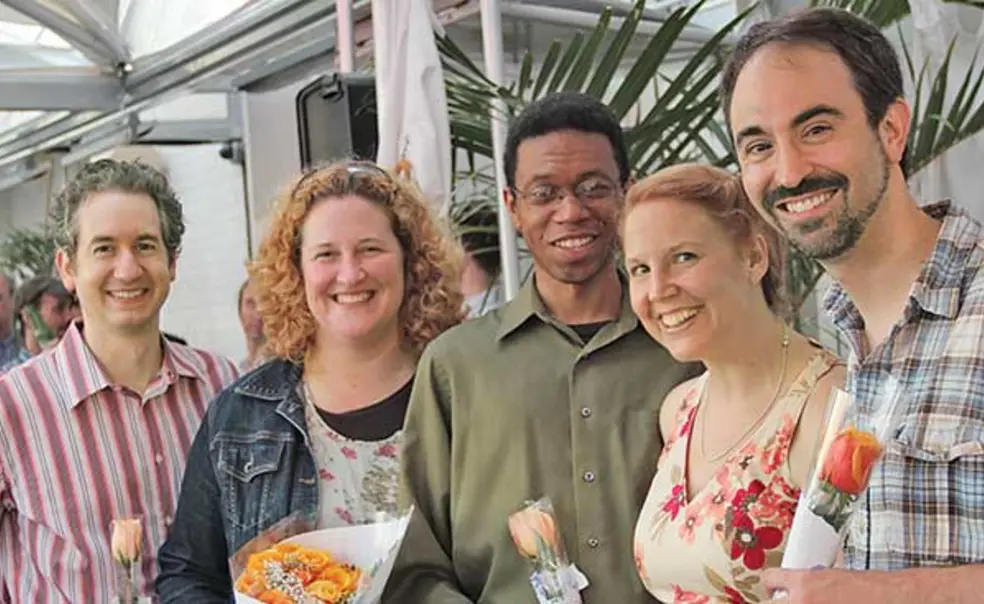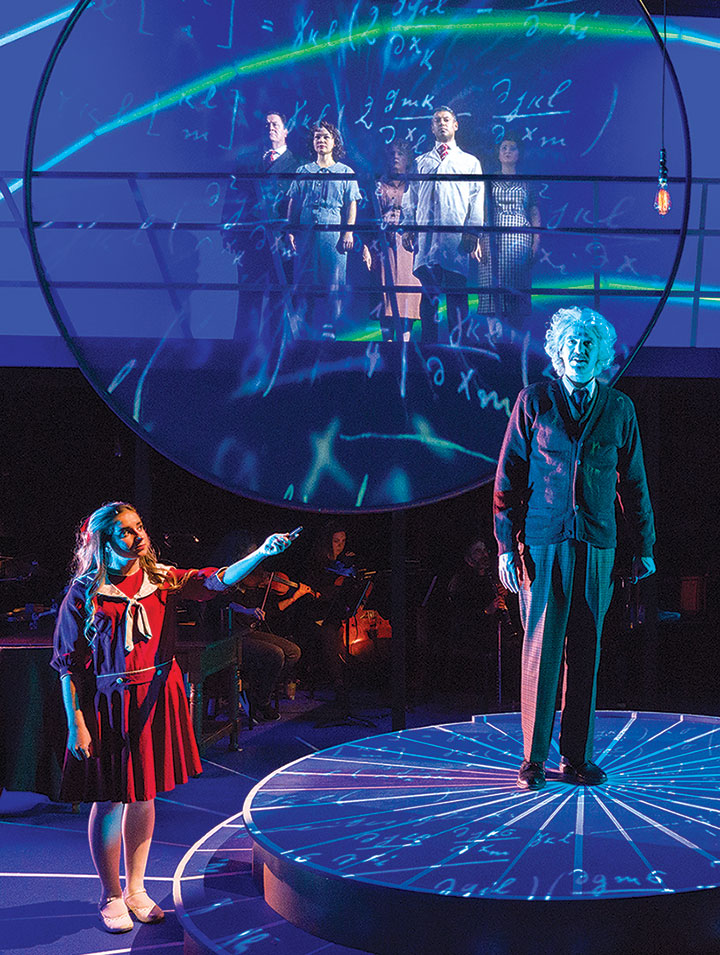Prospect Theater Company: Stage Whisperers
How a group of friends who met at Princeton are holding the stage
Albert Einstein didn’t dance — that we know of — but three of him are dancing, simultaneously, at a rehearsal for the Prospect Theater Company’s new musical, Einstein’s Dreams.
One is Einstein himself, the lead character (played by Zal Owen), dancing with his imaginary muse, Josette (Alexandra Silber). There are also two other pairs of Einsteins and Josettes, in parallel universes, as Einstein imagines multiple possible futures. The musical focuses on Einstein’s life in the spring of 1905 as he developed his theory of special relativity while working in the Bern, Switzerland, patent office. Not exactly song-and-dance fodder, perhaps, but Cara Reichel ’96, the show’s director, is making it work.
Einstein’s Dreams is adapted from the 1992 novel of the same name by Alan Lightman ’70. Lightman’s novel has been adapted for more than 100 theatrical productions over the years, but he calls this “one of the best.” He says he appreciates the continuing interest in his book and is pleased to let others stage it in their own ways. “I’ve drawn inspiration from many other artists over the years, so it’s gratifying to be able to pay back some of that debt.”
The show’s Princeton connections are overwhelming. Besides Lightman (and Einstein, who was never a University professor but was frequently found in the original Fine Hall), the Prospect Theater Company was founded in 1998 by five alums: Reichel, her now-husband Peter Mills ’95, Melissa Huber ’96, Tony Vallés ’97, and Charles Perkins ’96. All but Perkins remain with the company: Reichel is the producing artistic director; Mills, officially listed as an associate artist, writes the music and lyrics for many Prospect shows; Huber is managing director; and Vallés is communications director.
Prospect is dedicated to bringing new musicals to the stage, but in terms of its history a better theatrical analogy might be to those old Judy Garland-Mickey Rooney “Let’s put on a show!” musicals from the 1930s. The company’s founders met as undergraduates, performing in campus productions.
Reichel and Mills met at Triangle auditions in the fall of her freshman year. Mills, who was playing piano, recalls that Reichel sang “My Funny Valentine,” but with an unusually complicated piano score. “I was very flustered by the arrangement,” he says. “Also by her.”
For the remainder of their undergraduate years, the friends worked in Triangle shows and with the Princeton University Players, where Reichel got her first directing experience. In the summer of 1996, they remained on campus to do a full slate of shows with Princeton Summer Theater. It was their first chance to experience theater as a profession rather than an extracurricular activity.
After that, the friends went their separate ways, but their desire to reconnect was the seed from which their theater company was born. In 1999, Reichel was looking for a directing or producing class. “I decided that producing a show would teach us just as much as taking a class on producing a show,” she says. The five dipped into their own pockets for their first show, an adaptation of Everyman, with several original songs. It ran for one weekend in a children’s theater in the West Village.
The 15th-century morality play was an unusual choice to get a fledgling theater company off the ground. But, Reichel says, Everyman was in the public domain, so they could do it for free. Religious drama had also interested her. In 1995, for her junior paper in anthropology, she developed an “environmental passion play” exploring the relationship between religious ritual and theater performance, which she staged in and around the University Chapel with members of the Chapel Choir.
Freelance artists learn to seize any opportunity that comes along, so in the summers of 1999 and 2000, the group decamped to Reichel’s hometown of Rome, Ga., to do summer stock, this time staging more traditional shows such as As You Like It and The Pirates of Penzance. Everyone lived together in college housing and cooked their meals communally to save money. Reichel calls it a “theater kibbutz.” Returning to New York, Prospect staged its first full season in 2002. It has since produced more than 30 new musicals.
While some have complained that too many current Broadway musicals are safe adaptations of hit movies or glorified concert shows, several recent Tony Award-winning musicals started off-Broadway, including Hamilton, Hadestown, and Dear Evan Hansen. “Off-Broadway is where the most exciting stuff is happening,” Mills insists.
Mills, once dubbed “Off-Broadway’s Golden Boy” by BroadwayWorld.com, has collaborated with Reichel to develop several of Prospect’s new musicals but has also worked on his own projects, including a musical adaptation of the classic TV show The Honeymooners in 2017. He won the ASCAP Foundation’s Richard Rodgers New Horizons Award in 2003 and its Cole Porter Award in 2011. For the last 15 years, Mills has also commuted to Princeton as music director for the Triangle Club.
In many cases, Reichel and Mills co-author the show’s “book” while Mills pens the songs and lyrics. Their 2005 show, The Pursuit of Persephone, focused on the college romance between F. Scott Fitzgerald 1917 and Ginerva King and was loosely adapted from Fitzgerald’s novel This Side of Paradise. Mills received a Drama Desk nomination for his original score and orchestration. In 2014, he and Reichel reconfigured the show with new songs and restaged it under the title The Underclassman.
Hello Girls, which ran last year, told the story of the female telephone operators who worked on the front lines during World War I. Critics praised it both as history and as entertainment. “Move over, Mean Girls and Wicked,” Raven Snook wrote in Time Out New York, “there’s a new musical exploding with grrrl power, female camaraderie, and uplifting songs, and it teaches an essential piece of history to boot.”
Reichel and Mills returned to campus in 2017 to teach an atelier in conjunction with the Princeton and Slavery Project. Their course examined Princeton’s historical relationship with slavery through the depiction of race on the stage. With a reading list that ranged from a history of 19th-century American song to Stephen Sondheim’s autobiography and the script of Hamilton, students worked with primary source materials to create an original musical-theater piece.
Einstein’s Dreams, which was written by Joanne Sydney Lessner and Joshua Rosenblum, was first performed in Portugal, where Lessner and Rosenblum had staged another musical, Fermat’s Last Tango, about the famous 17th-century mathematician. Reichel learned about it when she and Rosenblum worked together several years ago and bonded over a shared interest in physics. Rosenblum sent her the script, and Reichel was entranced.
Many new plays are developed in small readings and workshops, but musicals are more difficult and expensive to get off the ground. Huber, Prospect’s managing director, believes that the company provides unique opportunities for emerging writers to get their shows on stage. “An audience,” she says, “is integral to learning how a show is going to breathe.” They can even get Einstein to dance.
Einstein’s Dreams runs through Dec. 14 at the 59E59 Theaters in New York City.
For the Record
An earlier version of this story misidentified the actor who plays Josette.













No responses yet